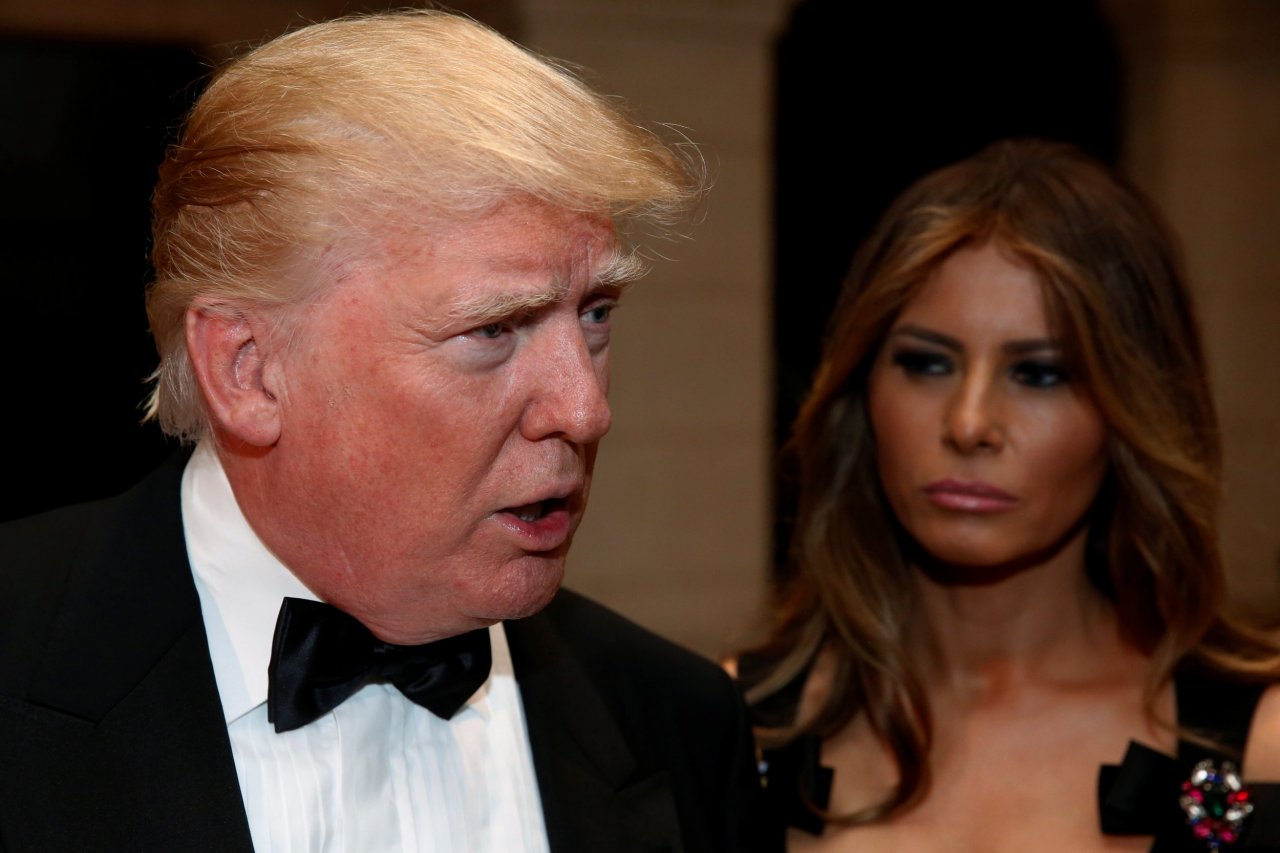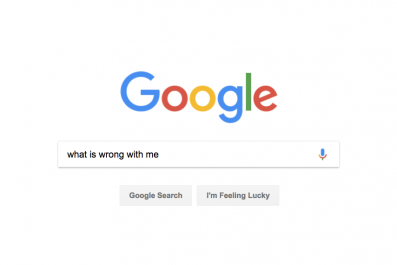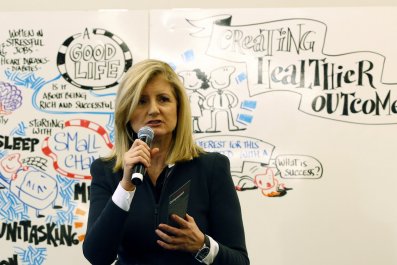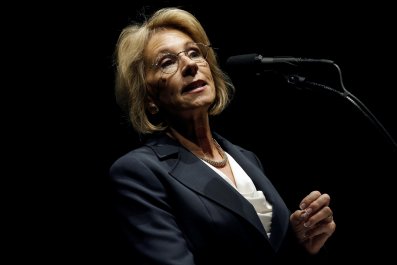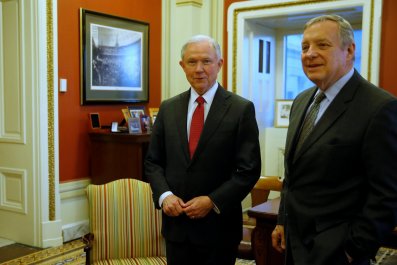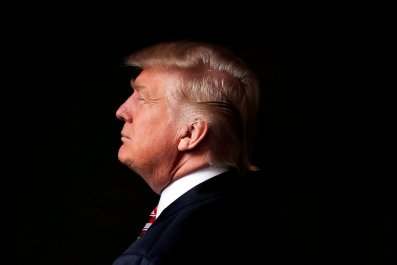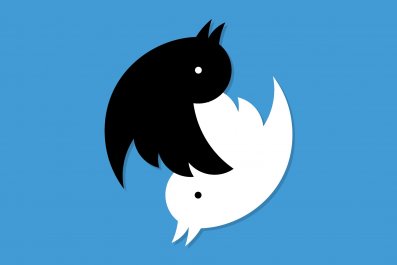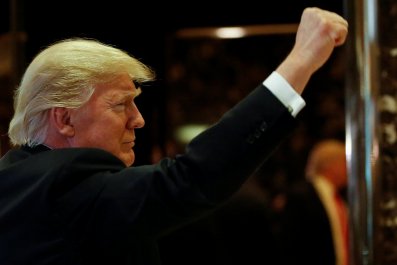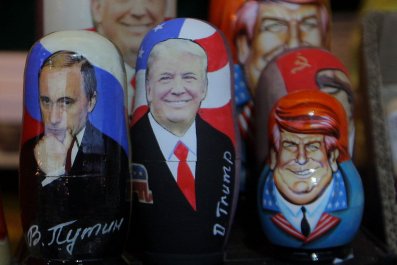If all his other cultural blasphemies did not finish off Donald Trump, his grab-them-by-the-pussy line, in the overwhelming opinion of the liberal media, would. That it did not might suggest that many cultural certainties are a lot less firm than most of the media and culture industry thought. Twenty years (or so) of rule tightening about how we talk about sex, gender, race and our multicultural society—what is disparagingly called political correctness, or, more inclusively, the liberal point of view—was put up for review by Trump's election.
The ongoing expressions of shock on the part of the cultural establishment—expressed on a daily basis by The New Yorker, New York magazine and The New York Times, anything, apparently, with New York in its title—reflect their fears that the development of a more careful, regulated and corrected world is about to be undone. That the unapologetic white male has returned. You could hardly find a more threatening and throwback version of that than Trump—a rich, voluble, egomaniacal, middle-aged pussy hound. To write him you would need some combination of authors like Norman Mailer, Terry Southern, Harry Crews and Gore Vidal, all notably out of step with current cultural norms.
The culture norm is as starkly confronted as the political norm with proof that it's not speaking to the lives of a sizeable part of the nation: that same pussy talk that shocked cosmopolitans turns out not to be of much concern, and even to express a casual day-to-day reality, for many Americans. Media fragmentation has created all sorts of thriving niches that accommodate the views of eager consumers, lessening the need to speak to a broader, more difficult-to-reach audience—the once-great mass market. (With no one speaking to it, it's had to largely contend itself with an expanding diet of sports—another overlooked point of the Trump voter connection, his several decades of red carpet presence at major sporting events.) And, too, convincing higher-fashion cultural consumers that their concerns are paramount ones.
Related: For James Murdoch and Megyn Kelly, the Sky is the limit
These are just "white man's problems," said an agent who in 2013 rejected a collection of short stories about middle-aged terrors and angst by 53-year-old Pennsylvania and working-class son Kevin Morris (transformed by the mysteries of American life into a top Hollywood entertainment lawyer), who promptly took that as the title for his book—think Richard Ford, John Cheever and Bernard Malamud, all writers who are also out of fashion—which he then self-published through Amazon. (The self-publishing world is an extraordinary and vibrant parallel culture, hardly recognizable to the official bookish world). When Grove/Atlantic's Morgan Entrekin shortly thereafter bought Morris's first novel, All Joe Knight, about sex and race and money, told through the eyes of a lower-middle-class white kid who grows up to be an alienated middle-aged white guy, "we struggled," he said, "to think of like-minded writers who could blurb the book and could hardly come up with any." The book, published shortly after the Trump election, and, in its political incorrectness and protean language, something of an instant samizdat-like favorite at least among other older male writers, has yet to be reviewed by The New York Times.
Instinctively or by canny plan, Trump converted the conservatives' parochial and rate-limiting culture war on abortion and gay marriage into a much more visceral campaign against the political pieties of sophisticated America, with Trump as the ultimate revenge on upper-middlebrow cultural life. It's the mannered and effete against the profane and immediate.
For Trump, Hillary Clinton, in her guardedness and suspicion, in her inability to express herself with any openness and spontaneity, summed up out-of-touchness, struggling to attract crowds of a few hundred, while he was pulling tens of thousands.
Trump's attacks on the media served to say that his language, his expressiveness, his ability to connect with the audience was more potent than the media's. (In an interview with Trump shortly after his nomination was secure, he told me he was sure of victory when for the first primary debate, the usual audience increased almost tenfold because of his presence: "I'm more entertaining than the media.") The media, in thrall to the culture establishment—and signed on to its cultural rules and concerns (hence its Pussygate shock)—was inauthentic and he was the real thing. For "CNN sucks"-screaming Trump supporters, CNN sucks for, in fact, the same reason that it sucks to everybody else—it's phony and slavish—but Trumpsters were suddenly saying it, screaming it. (Liberals took this as an attack on free speech; on Trump's side, the view was that the media stifles real speech.)
This attack on careful, orderly, prescribed culture is what happens when the culture stops talking about real things—at least what a significant part of the country regards as real and important. Or, it is—and certainly is inevitably thought to be by those cultural standard bearers under attack—a sinister onslaught against enlightenment itself.
In the view of the latter camp, Steve Bannon, one of the masterminds of the Trump campaign, and the new administration's "chief strategist," becomes a preeminent retrograde white male bugaboo. The non-Trump culture can only see him as a threat, and sore thumb, and, without the means to describe or recognize anybody too far outside its circle, a racist, misogynist, anti-Semite. And yet, not that long ago, Bannon would have been a perfectly recognizable figure, even an admirable one, an ex-military and up-from-working-class guy, striving, through three marriages and various careers, to make it, but never finding much comfort in the establishment world, wanting to be part of it, and wanting to explode it at the same time—a character for a writer like Kevin Morris. An American man's story. Republican politics is filled with such strivers—Lee Atwater, Roger Ailes, Karl Rove—great characters reduced to violations of liberal sensibilities.
Indeed, the election reengages a gender battle that many people on the New York side of the Trump gap had thought was mightily going in only one direction. The vestigial and primitive American man, unreconstructed, baying at the moon (probably high on opiates)—the alt-right in the liberal view—voiceless for many years (or, anyway, wise to shut up), now had Donald "Let me be your voice" Trump. The obvious message of his sudden resurgence of course is that he didn't go away or reform: He was just shut out. Without any place in upper-middlebrow culture, except as an occasional enemy of reason or subject of scandal, there was no bridge to who he was—no humanity left for him.
Hence, while the liberal media was helping to eject that ultimate white man devil figure Roger Ailes from Fox News for real and perceived sins against women (it seemed not to much matter which), the country was making a pussy-grabber president. The gap between HR departments and the real world is a story obviously not being told very well. A story whose ambiguities and nuances could not now be written—nor its real language uttered—because the cultural establishment sees no ambiguities and nuances and, for sure, doesn't allow those words. But meanwhile, a good part of the country—unable to communicate with the cultural establishment—sees only hypocrisy.
There is a new left and a new right. On the one side there are the unremitting orthodoxies of correct behavior and language reaching its apogee in that weird children's crusades on college campuses, a frightening and ineffectual exercise in cultural reengineering. (The Clinton campaign tried to display "best cultural reengineering practices" with its near-parody of inclusiveness at its Philadelphia convention.) On the other side, there are cadres of radical provocateurs who provoke their foes into greater and greater flights of hysteria—mocking the left's uptightness the way the left used to mock the right's. And, on each side, there are social media guerilla forces to support them. The cultural establishment sees its natural allegiance to the academic and millennial left, no matter how loopy. The new Trump establishment lets the new right rile the new left into an ever-greater lather of appalled inexpressiveness, its enemies all fascists, white-supremacists, anti-feminists, transphobics. The more the left is provoked, the more it defends itself, making it more difficult for anybody in the ever-left-leaning culture business to deviate from the prescribed rules.
Gawker, once a jaunty gossip site, became in its later years a feral enforcer of new left morality—self-righteous, millennial, post-feminist something-or-others out to shame any man (assumption being that millennial men have proper feminist sensibilities) it found having any sort of sex except the most formal and traditional as base and corrupt. The lawsuit over its airing of a secretly filmed sex tape of the wrestler Hulk Hogan that closed it down this past summer was funded by Trump-supporting billionaire Peter Thiel (whose sex life Gawker had previously outed). The jury that found Gawker's shaming of Hulk Hogan a violation of his privacy presumably would also—in a bizarre inversion of who stands on what side in the permissive society—not have been too bothered by Trump's pussy tape. The old world, suddenly more understanding of human foibles than the new, was striking back.
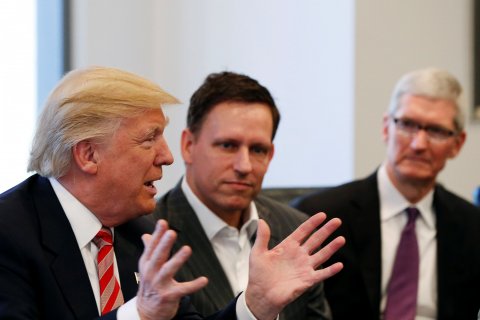
In a recent editor's note, Vanity Fair's Graydon Carter, a man always sniffing the ground for the next zeitgeist turn of the worm, began a predictable tirade against the gaucheries of Trump, only to pause to acknowledge that several decades of political correctness was bound to breed resentments in the people being "corrected." This was notable because Vanity Fair is carefully edited to avoid any incursions on upper-middlebrow taste and attitudes, and because Carter, ever attentive to cultural shifts, was, despite his longtime hostility to Trump, obviously seeing the writing on the wall.
Similarly, a few weeks prior to the Trump inaugural, Anthony Bourdain, who has struggled to mix liberal foodie snobbery with the authenticity of actual kitchen work and workers, made an extra effort to emphasize his brand and seize the Trumpian high ground (the high low ground as it were). "I've spent a lot of time in gun-country, God-fearing America. There are a hell of a lot of nice people out there, who are doing what everyone else in this world is trying to do: the best they can to get by, and take care of themselves and the people they love…. The self-congratulatory tone of the privileged left—just repeating and repeating and repeating the outrages of the opposition—this does not win hearts and minds."
In both instances, the point seems not so much political—Carter and Bourdain are still liberals—but about hearing a professional wake-up call. Media works better when it reflects than when it resists (its truest hucksters understand that). People will choose the authority they recognize.
America as a large and often absurd idea used to be our major cultural subject, a celebration or at least a carnival of saints and sinners, each to be found in life's varied walks, all with screwy prejudices and unique ways to express the disorder of American life. It is the inability of the media and cultural officials to deal with Donald Trump's disorderly America or to speak to it in a language it understands or to credibly make it part of the stories we tell about ourselves, or to find a common joke, that has now helped to bring Trump's America center stage—indeed, it rather forced itself here. And it's now an unavoidable story, just begging for someone to be able to tell it.



